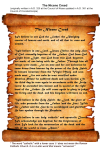KJV (English):
John 15:26
But when the Comforter is come, whom I will send unto you from the Father, even the Spirit of truth, which proceedeth from the Father, he shall testify of me:
Greek:
Οταν ἔλθῃ ὁ παράκλητος ὃν ἐγὼ πέμψω ὑμῖν παρὰ τοῦ πατρός, τὸ πνεῦμα τῆς ἀληθείας ὃ παρὰ τοῦ πατρὸς ἐκπορεύεται, ἐκεῖνος μαρτυρήσει περὶ ἐμοῦ:
Now, whenever the consoler which I shall be sending you from the Father may be coming, the spirit of truth which is going out from the Father, that will be testifying concerning Me.
English version takes the Greek "THAT" and makes it into "HE."
That's not what the Greek states!
It states "THAT!"
So when the English makes "THAT" into "HE" and we read "HE" we think Person.
When you read "THAT" you don't think person!
John 15:26
But when the Comforter is come, whom I will send unto you from the Father, even the Spirit of truth, which proceedeth from the Father, he shall testify of me:
Greek:
Οταν ἔλθῃ ὁ παράκλητος ὃν ἐγὼ πέμψω ὑμῖν παρὰ τοῦ πατρός, τὸ πνεῦμα τῆς ἀληθείας ὃ παρὰ τοῦ πατρὸς ἐκπορεύεται, ἐκεῖνος μαρτυρήσει περὶ ἐμοῦ:
Now, whenever the consoler which I shall be sending you from the Father may be coming, the spirit of truth which is going out from the Father, that will be testifying concerning Me.
English version takes the Greek "THAT" and makes it into "HE."
That's not what the Greek states!
It states "THAT!"
So when the English makes "THAT" into "HE" and we read "HE" we think Person.
When you read "THAT" you don't think person!
For instance, in this case Parakletos (comforter, advocate) is used of the Holy Spirit, and in 1 John 2:1, it is used in reference to Jesus.
Therefore your claim that it is not used in regards to a person in John 15:26 is disingenuous or ignorant at best, and I suspect it is a deliberate attempt to deceive less knowledgeable Trinitarians.
The Holy Spirit is a parakletos (comforter, advocate) for believers, in a similar way as Jesus is, the other advocate.
By the way, the cult I belonged to as a young person denied the Personhood of the Holy Spirit too.
I am beginning to think that anti-Trinitarians are simply evil and not just ignorant.

